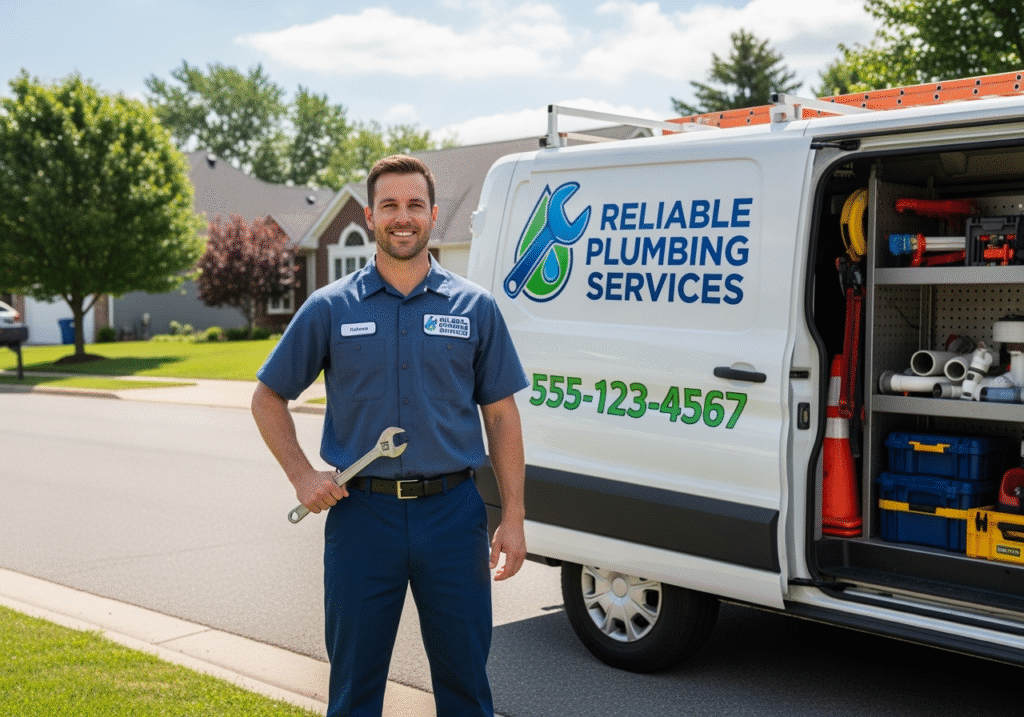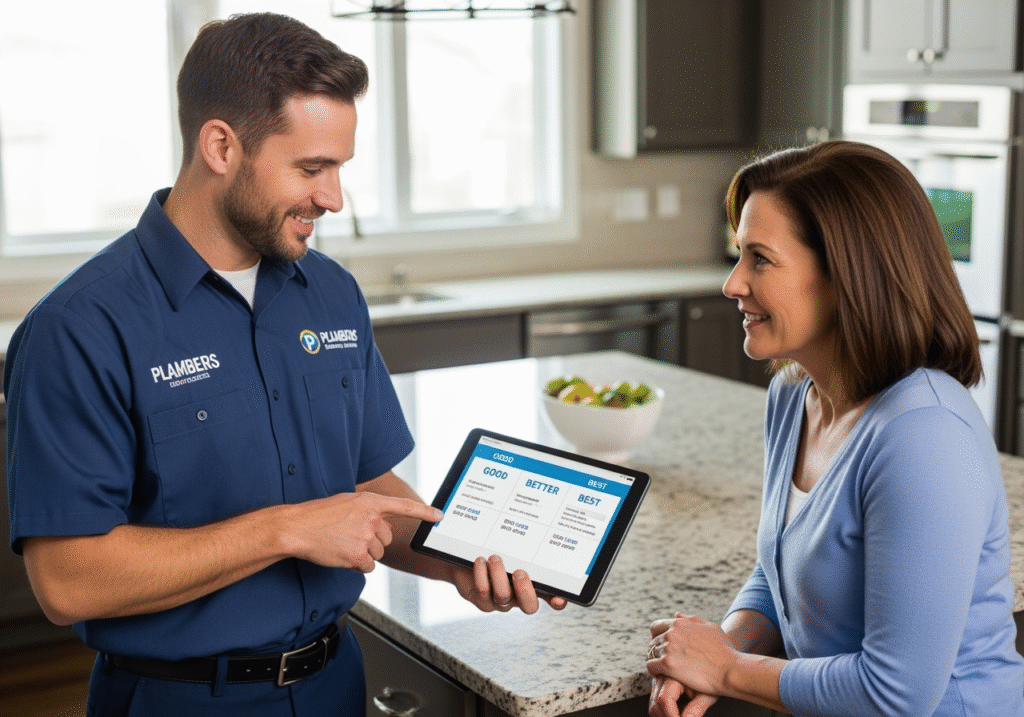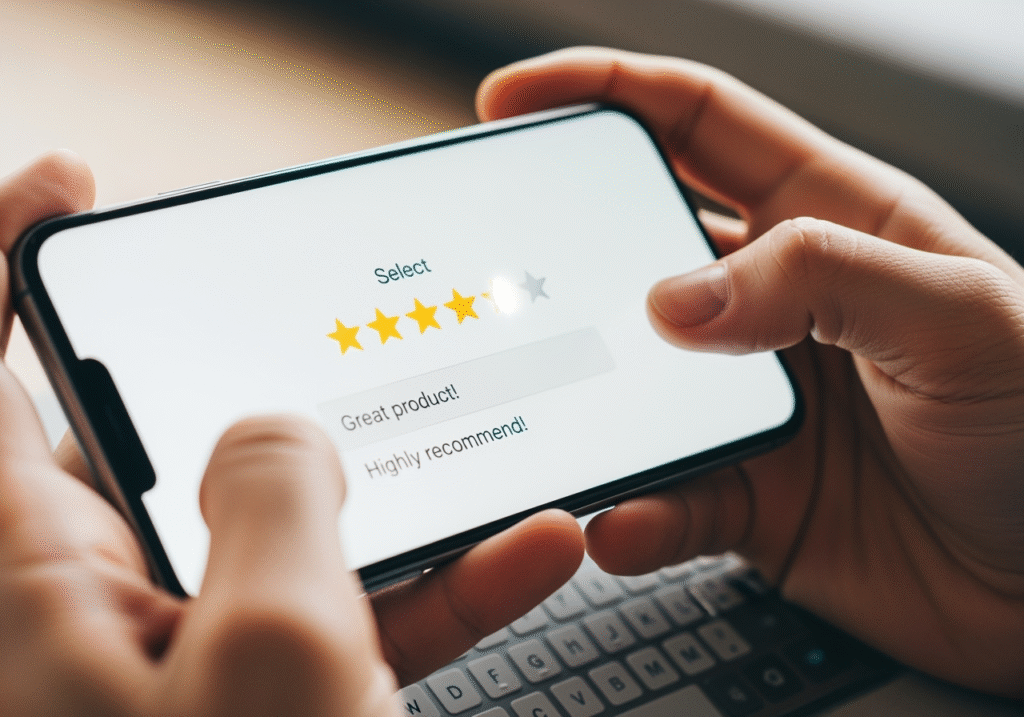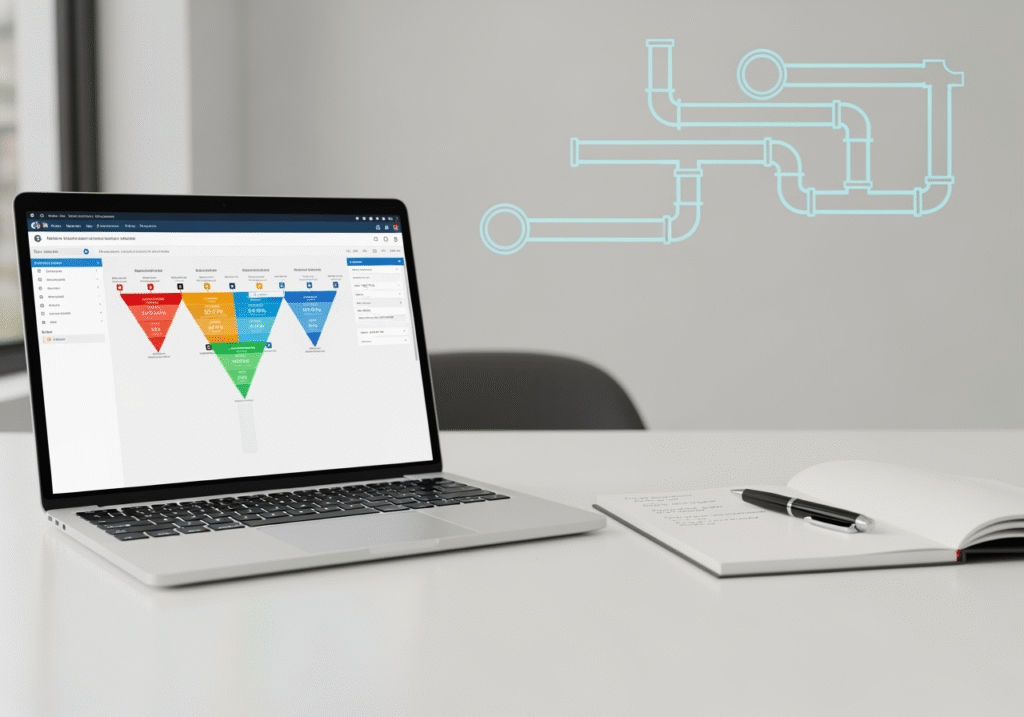Laying the Groundwork: Building a Sales-Ready Brand
In the busy world of plumbing, simply being skilled with a wrench isn’t enough to guarantee success. We know the market is crowded. There are over 113,000 plumbing businesses registered in the U.S.. To truly thrive, we need more than just technical expertise. We need innovative sales strategies.
These strategies help us stand out. They build trust with potential customers. They turn a one-time service call into a lasting relationship. Our goal is to move beyond just fixing pipes. We want to create loyal clients who choose us every time.
This guide will explore how to build a strong brand. We will cover effective sales techniques. We will also show you how to foster customer loyalty. By the end, you’ll have a clear roadmap. This roadmap will help you turn leads into repeat customers. It will help your plumbing business grow successfully.

Before closing a sale, we must establish a foundation of trust and professionalism. Our brand is more than just a logo; it’s the sum of every customer interaction with our business. Every touchpoint shapes their perception from the moment they first hear about us to the final handshake. Building a sales-ready brand means ensuring that our first impression is impeccable, our online presence is robust, and our unique value is clearly communicated. This credibility is what truly sets the stage for successful sales.

Create a Professional and User-Friendly Website
Our website serves as our 24/7 virtual storefront. For many potential customers, it’s the first place they’ll look when a plumbing emergency strikes or they’re planning a renovation. Therefore, it must be professional, informative, and easy to steer.
A mobile-first design is no longer optional; it’s essential. Most web traffic now comes from mobile devices, meaning our website needs to load quickly and display flawlessly on smartphones and tablets. Clear contact information, prominently displayed, is crucial for those urgent calls. We should also include detailed descriptions of our services, outlining what we offer and how to solve our customers’ problems. Online booking or a clear call-to-action for scheduling appointments can significantly streamline the customer journey.
Customer testimonials and case studies build social proof, showcasing our expertise and reliability. Finally, a basic understanding of local SEO (Search Engine Optimization) is vital. This involves ensuring our website content includes local keywords (e.g., “emergency plumber [your city]”, “drain cleaning [your neighborhood]”) and that our business name, address, and phone number (NAP) are consistent across all online platforms. This helps search engines connect local customers with our services.
Define Your Target Audience and Unique Value Proposition
Effective sales begin with understanding who we are trying to sell to. Attempting to be everything to everyone often results in being nothing to anyone. By identifying our ideal customers, we can tailor our marketing messages and sales approach to resonate deeply with their needs and pain points. Are we primarily serving residential homeowners, commercial businesses, or both? Do we specialize in emergency repairs, new installations, water heater services, or eco-friendly plumbing solutions?
A thorough competitor analysis can illuminate standard customer bases and identify underserved niches. This process helps us refine our unique value proposition (UVP) – what makes our plumbing business distinct and better than the competition. Perhaps it’s our rapid response time, specialized equipment, commitment to customer education, or comprehensive warranty programs.
Poor targeting causes untold losses in ad spend every year. By clearly defining our target audience and articulating our UVP, we ensure that every sales and marketing effort is focused and impactful, reaching the people most likely to need and appreciate our services.
Master the First Impression
In plumbing, the first impression isn’t just about a phone call or a website visit; it’s often about the physical presence of our team and equipment. When our technicians arrive at a customer’s property, they are the face of our brand. Professional uniforms, clean and well-maintained vehicles, and organized tools all contribute to an immediate sense of competence and trustworthiness. These visual cues signal the customer that we take our work seriously and respect their property.
Beyond appearance, the interaction itself is paramount. Active listening allows us to truly understand the customer’s problem, concerns, and expectations. Clear communication means explaining the issue in simple, understandable terms, avoiding jargon, and outlining the proposed solutions and their benefits. Building rapport involves empathy, professionalism, and a genuine desire to help. When customers feel heard, respected, and confident in our expertise, they are far more receptive to our recommendations and more likely to trust us with their business. Mastering the first impression transforms a routine service call into a positive sales opportunity.
From Pitch to Profit: Sales and Plumbing Business Warranty Strategies
Once the groundwork is laid, the next step is to convert initial interest into profitable sales. This phase moves beyond fixing a problem to offering comprehensive solutions that add value and build customer confidence. Value-based selling, which focuses on our services’ long-term benefits and peace of mind, is crucial for overcoming price objections and increasing the average ticket value. By empowering our technicians with the right tools and training, we can ensure they are not just problem-solvers but also trusted advisors, guiding customers toward the best options for their needs.

Using Warranties as a Trust-Building Tool
Offering comprehensive warranties can be a significant differentiator and a powerful sales tool in a competitive market. When we stand behind our work and the products we install, we immediately reduce the customer’s perceived risk. This peace of mind is invaluable, especially for larger, more expensive jobs like water heater replacements or sewer line repairs.
By offering robust plumbing business extended warranties, we can justify premium pricing, as customers are often willing to pay more to protect their investment. These warranties demonstrate our confidence in our craftsmanship and the quality of our materials. They transform a transactional interaction into a trust-based relationship, making customers more likely to choose us over competitors who offer only standard, limited guarantees. This strategy helps us close more high-ticket jobs and improves our reputation as a reliable and customer-focused plumbing provider.
Developing Maintenance Agreements and Other Plumbing Business Warranty Strategies
Beyond individual job warranties, maintenance agreements are a cornerstone of building recurring revenue and fostering long-term customer loyalty. These agreements provide a predictable income stream for our business while offering significant customer benefits.
Consider these key elements to include in a compelling maintenance plan:
- Priority Service: Customers with agreements receive faster response times, especially during peak seasons or emergencies.
- Exclusive Discounts: Offer reduced repairs, parts, or future installation rates.
- Annual Inspections: Proactive checks can identify potential issues before they become costly emergencies, saving customers money and inconvenience.
- Extended Warranty Coverage: Integrate longer warranty periods on parts and labor for agreement holders.
- Transferability: Make the agreement transferable to a new homeowner, adding value to their property.
This approach aligns perfectly with the understanding that there’s a 60-70% chance of selling to an existing customer, while new prospects are only 5-20% likely to buy. By nurturing our existing client base through valuable maintenance agreements, we secure repeat business and create advocates for our brand. Upselling these service agreements during or after a service call, highlighting the long-term savings and peace of mind, is a highly effective sales strategy.
Empowering Your Technicians with Sales Training
Our technicians are often the primary point of contact with customers, making them critical players in our sales strategy. While their technical skills are paramount, equipping them with practical sales training can transform them from mere problem-solvers into trusted advisors who can identify and present additional value to customers.
This training should focus on shifting their mindset from purely technical to solution-focused. It’s not about being pushy, but about educating customers on the best long-term solutions for their homes. Key areas of training include:
- Communication Skills: How to explain complex plumbing issues in simple terms, answer questions clearly, and listen actively to customer concerns.
- Value Presentation: Articulating the benefits of recommended services, products, or maintenance agreements, focusing on savings, comfort, and peace of mind rather than just features.
- Identifying Opportunities: Training them to spot potential issues during routine service calls (e.g., an aging water heater, inefficient fixtures) and tactfully suggest preventative measures or upgrades.
- Using Technology: Equipping them with mobile software allowing on-site quoting, presenting good-better-best options, and efficiently processing payments. This professionalism improves the customer experience and streamlines the sales process.
- Aligning Incentives: Creating compensation structures that reward technicians for achieving sales goals related to maintenance agreements or approved upgrades, fostering a sales-positive culture.
By investing in our technicians’ sales capabilities, we prepare them for the evolving demands of the skilled trades, ensuring they are well-rounded professionals who contribute significantly to our business’s profitability and customer satisfaction.
Beyond the Sale: Fostering Loyalty and Measuring Growth
The transaction isn’t the end of the customer journey; it’s merely a milestone. Actual business growth and sustained profitability come from fostering deep customer loyalty and continuously nurturing those relationships. This final stage of our sales strategy focuses on maximizing customer lifetime value through ongoing engagement, proactive communication, and a data-driven approach to understanding what works and what doesn’t. By prioritizing customer satisfaction and feedback, we secure repeat business and transform satisfied clients into enthusiastic brand advocates.

Leveraging Online Reviews and Customer Referrals
In an age where trust is paramount, online reviews and customer referrals act as powerful endorsements. They are the modern-day word-of-mouth, building social proof that can significantly influence new customers. Seventy-five percent (75%) of consumers read online reviews when browsing for local businesses. This statistic alone underscores the critical importance of actively managing our online reputation.
We should implement strategies to automate review requests after every service call, making it easy for satisfied customers to share their positive experiences. Promptly responding to all positive and negative feedback demonstrates our commitment to customer satisfaction and transparency. Positive reviews should be showcased prominently on our website and social media.
Beyond reviews, creating a structured referral program with incentives can turn our happy customers into active promoters. A common and effective strategy is offering a discount on future services for the referrer and the new customer referred. This not only generates new leads but also strengthens the loyalty of our existing customer base.
Nurturing Relationships with Email and Content Marketing
Staying top-of-mind with our customers is crucial for repeat business. Email marketing and valuable content creation are highly effective, cost-efficient ways to achieve this. Consider that approximately every dollar spent on email marketing generates $45. This impressive ROI highlights its power in customer engagement and lead generation.
We can use email campaigns to send seasonal plumbing tips (e.g., winterizing pipes, summer maintenance), gentle reminders for annual inspections or routine maintenance, and exclusive offers. Personalized communication, such as addressing customers by name and referencing past services, makes these messages feel more relevant and less like generic advertising.
Complementing email and sharing helpful blog articles or short video content on our website and social media establishes us as experts. Topics could include “DIY fixes for minor clogs,” “Understanding your water heater,” or “The benefits of a whole-home water filtration system.” This content provides value, builds trust, and keeps our brand at the forefront of customers’ minds, ensuring they think of us first for their plumbing needs.
Tracking Key Metrics to Measure Sales Success
To truly understand the effectiveness of our sales strategies and ensure continuous improvement, we must rigorously track key performance indicators (KPIs). Without data, we’re simply guessing. By monitoring these metrics, we can identify what’s working, where adjustments are needed, and how our efforts translate into tangible business growth.

Some essential KPIs for plumbing sales include:
- Lead Conversion Rate: The percentage of leads that turn into paying customers. This indicates the effectiveness of our sales process.
- Average Job Value: The average revenue generated per service call. This helps us understand the impact of upselling and cross-selling.
- Customer Acquisition Cost (CAC) is the total cost of marketing and sales efforts divided by the number of new customers acquired. It measures the efficiency of our customer acquisition strategies.
- Customer Lifetime Value (CLV): The total revenue we expect to generate from customers over their relationship with our business. This highlights the importance of customer retention and loyalty programs.
- Close Ratio: The percentage of presented estimates that result in a booked job. This indicates the sales effectiveness of our technicians.
- Referral Rate: The percentage of new customers acquired through referrals. This measures the success of our referral programs and customer satisfaction.
We can gather and interpret this data by utilizing analytics tools, such as Google Analytics for website traffic, CRM software for lead management, and specialized field service management platforms for job tracking. Regularly reviewing these KPIs enables us to make data-informed adjustments to our sales processes, marketing campaigns, and technician training, ensuring our strategies are continually optimized for maximum success.
You may also like
-
Expert Plumbing Solutions for All Your Residential and Commercial Needs
-
What’s Behind That Leak? Plumbing Problems You Should Never Ignore
-
How plumbing services can help with bathroom and kitchen remodels?
-
Expert Tips One Should Know Before Choosing the Perfect Residential Plumbers
-
When is the Best Time to Buy Plumbing Equipment?

